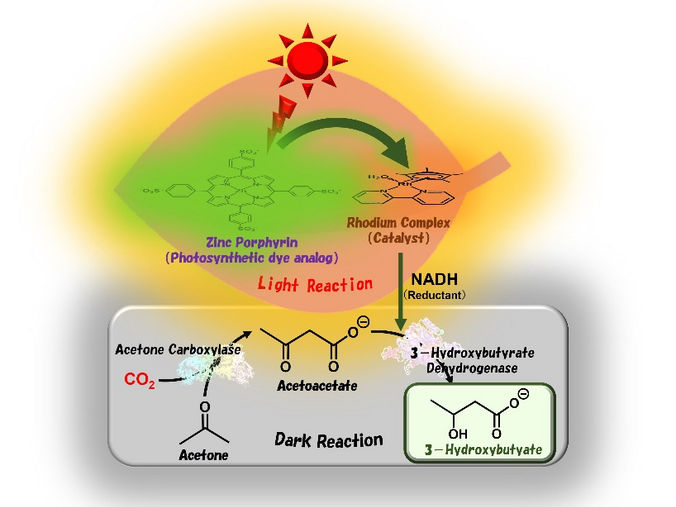Success in synthesizing biodegradable plastic materials using sunlight and CO₂
80% yield!
Tremendous effort has been put into making plastics not only durable and convenient but also environmentally-friendly materials for everyday products. Osaka Metropolitan University scientists made a significant advance in this journey with their innovative artificial photosynthesis technology that produces biodegradable plastics from acetone and CO2, addressing the plastic waste crisis while moving toward the goal of carbon neutrality. Their findings were published in Chemical Communications.

Utilizing sunlight and biocatalysts, Osaka Metropolitan University scientists synthesized 3-hydroxybutyrate, a biodegradable plastic material, from acetone and CO2. Mimicking natural photosynthesis, the team artificially reproduced a light reaction, which involves sunlight, and a dark reaction, which fixes CO2.
Yutaka Amao, OMU
The research team led by Professor Yutaka Amao from the Research Center for Artificial Photosynthesis at Osaka Metropolitan University has successfully synthesized 3-hydroxybutyrate, a raw material for poly-3-hydroxybutyrate (PHB)—a strong water-insoluble polyester used for packaging materials—from acetone and CO2. With a visible light-driven catalytic system utilizing sunlight and two biocatalysts, the researchers achieved a yield of about 80%.
Mimicking natural photosynthesis, the team artificially reproduced a light reaction, which involves sunlight, and a dark reaction, which fixes CO2, and synthesized 3-hydroxybutyrate.
This study is the latest in a series of the researchers’ articles on using artificial photosynthesis to produce useful substances, generate renewable energy, and achieve a carbon neutral society. “This research result of synthesizing 3-hydroxybutyrate, a raw material for PHB, from CO2 is a significant contribution to addressing both the plastic and CO2 reduction issues,” said Professor Amao. “In the future, we aim to produce 3-hydroxybutyrate through artificial photosynthesis using CO2 contained in exhaust gas emitted from factories.”
Original publication
Other news from the department science
Most read news
More news from our other portals
See the theme worlds for related content
Topic world Synthesis
Chemical synthesis is at the heart of modern chemistry and enables the targeted production of molecules with specific properties. By combining starting materials in defined reaction conditions, chemists can create a wide range of compounds, from simple molecules to complex active ingredients.

Topic world Synthesis
Chemical synthesis is at the heart of modern chemistry and enables the targeted production of molecules with specific properties. By combining starting materials in defined reaction conditions, chemists can create a wide range of compounds, from simple molecules to complex active ingredients.




























































